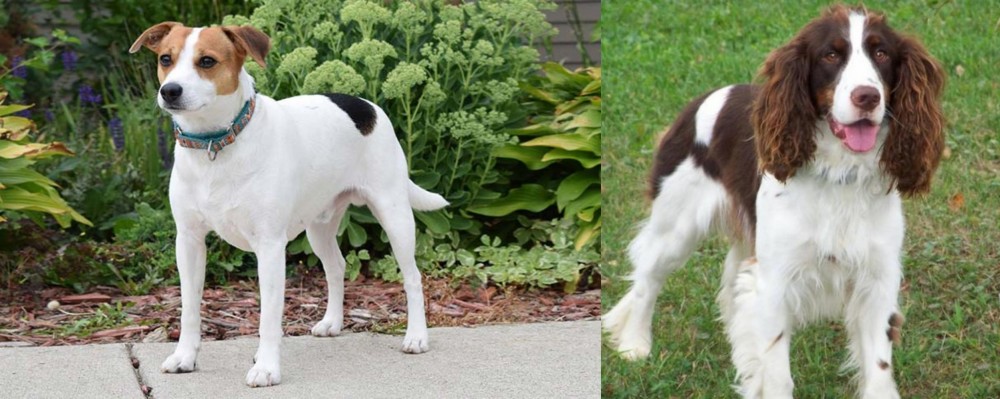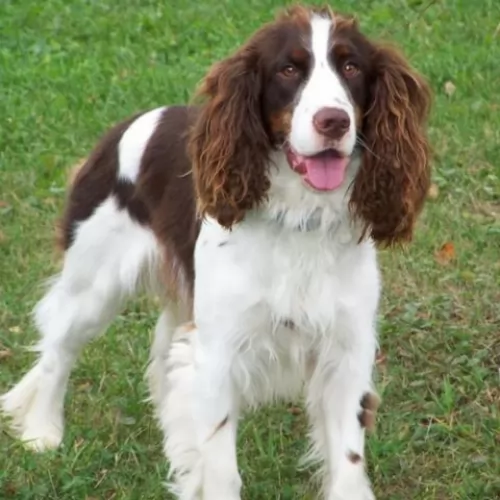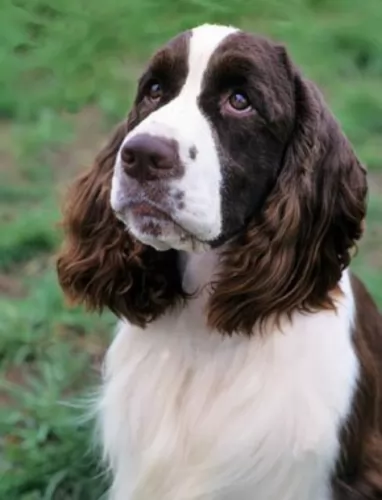 Petzlover
Petzlover Danish Swedish Farmdog is originated from Denmark but English Springer Spaniel is originated from United Kingdom. Danish Swedish Farmdog may grow 14 cm / 5 inches shorter than English Springer Spaniel. Danish Swedish Farmdog may weigh 13 kg / 28 pounds lesser than English Springer Spaniel. Both Danish Swedish Farmdog and English Springer Spaniel has almost same life span. Danish Swedish Farmdog may have less litter size than English Springer Spaniel. Both Danish Swedish Farmdog and English Springer Spaniel requires Low Maintenance.
Danish Swedish Farmdog is originated from Denmark but English Springer Spaniel is originated from United Kingdom. Danish Swedish Farmdog may grow 14 cm / 5 inches shorter than English Springer Spaniel. Danish Swedish Farmdog may weigh 13 kg / 28 pounds lesser than English Springer Spaniel. Both Danish Swedish Farmdog and English Springer Spaniel has almost same life span. Danish Swedish Farmdog may have less litter size than English Springer Spaniel. Both Danish Swedish Farmdog and English Springer Spaniel requires Low Maintenance.
 The Danish Swedish Farmdog has over the centuries been a versatile dog, working on farms. The history of this dog goes way back to the 1700s, being found in Denmark and Sweden where they originated.
The Danish Swedish Farmdog has over the centuries been a versatile dog, working on farms. The history of this dog goes way back to the 1700s, being found in Denmark and Sweden where they originated.
Today these dogs are also found in other countries. As life changed, the dog’s functions on the farm became less and the dog seemed to disappear somewhat. Both the Danish and Swedish Kennel Clubs worked together to bring back the breed, resulting in the first breed standard in 1987.
The Danish-Swedish Farmdog was also recorded in the American Kennel Club Foundation Stock Services in 2011. Today, most of these dogs are owned as family or companion dogs.
 The English Springer Spaniel is one of many gun dog breeds that flush and retrieve. They descended from the Shropshire Spaniels and Norfolk Spaniels. The English Springer Spaniel is somewhat similar to the Welsh Springer Spaniel and believe it or not they are also closely related to the English Cocker Spaniel. In the last century the cockers and springers came from the same parents. The larger dogs flushed game and made game “spring” from the brush while the smaller dogs – the “cockers” would hunt woodcock. Eventually through specific breeding, the UKC of England recognized the “springers” as a separate breed.
The English Springer Spaniel is one of many gun dog breeds that flush and retrieve. They descended from the Shropshire Spaniels and Norfolk Spaniels. The English Springer Spaniel is somewhat similar to the Welsh Springer Spaniel and believe it or not they are also closely related to the English Cocker Spaniel. In the last century the cockers and springers came from the same parents. The larger dogs flushed game and made game “spring” from the brush while the smaller dogs – the “cockers” would hunt woodcock. Eventually through specific breeding, the UKC of England recognized the “springers” as a separate breed.
Sydenham Edwards, in 1801, proposed that the spaniels be divided into the Springing or Hawking Spaniel and the Cocking or Cocker Spaniel. From this point on there was a flourish in the development of spaniel breeds in the 19th century. They were usually named for the county in which they were founded or after the individual who developed them. In 1902, the English Springer Spaniel was officially recognized as its own breed by the UKC. It was not until 1910 that the AKC recognized them as well.
 Nobody could be blamed for thinking that the Danish Swedish Farmdog is a Fox Terrier, because he looks very similar. He also has a short, smooth coat which is odor-free and he is a wonderfully low maintenance breed. The coat does however shed throughout the year.
Nobody could be blamed for thinking that the Danish Swedish Farmdog is a Fox Terrier, because he looks very similar. He also has a short, smooth coat which is odor-free and he is a wonderfully low maintenance breed. The coat does however shed throughout the year.
The coat’s main color is white with patches of black, fawn or chocolate brown. He can also be tri-colored. He is a small to medium sized dog with a compact body, standing between 32 - 37 cm and weighing about 7 – 12kg. He has a deep chest while the head is lean, small and triangular shaped. The ears are semi erect or they can be floppy while the tail is long.
The Danish Swedish Farmdog is not only intelligent, but he has other excellent characteristics that make him such a splendid pet. He isn’t aggressive, he is playful, loving, loyal, social and energetic.
He therefore makes an exceptional pet. He is an amusing pet who will prove to be entertaining too. He loves being part of all the family’s activities and gets on well with children and pets in the home.
You want to be sure that you provide him with exercise and games so that he doesn’t become bored, frustrated and destructive. After all, he is a breed that is used to be busy and he won’t do well with a family who puts him in the back yard and just leaves him.
 Among spaniels the English Springer is medium size and well compacted. Both the working dog and the show dog sport moderately long coats and a friendly tail. They both wear a gentle expression in their eyes. But there the commonality stops as the difference between the working English Springer Spaniel and the show line is greater in this breed than in any other. The gene pools have become almost separate over the last 70 years. If you put a field dog in the show ring they would not be able to compete. If you put a show line English Springer in the field, they would not have the stamina or speed for field trials.
Among spaniels the English Springer is medium size and well compacted. Both the working dog and the show dog sport moderately long coats and a friendly tail. They both wear a gentle expression in their eyes. But there the commonality stops as the difference between the working English Springer Spaniel and the show line is greater in this breed than in any other. The gene pools have become almost separate over the last 70 years. If you put a field dog in the show ring they would not be able to compete. If you put a show line English Springer in the field, they would not have the stamina or speed for field trials.
The field line has a coarser coat and less pendulous ears. They may dock a few inches off the tail, and they are much scruffier than the show dogs. On the other hand, the show dogs have dewlaps, pendant ears and dangling flews. They are heavier and thicker than the field dog. They have long muzzles, not so prominent eyes and docked tails. The English Springer Spaniel stands tall and proud, coming from an ancient line of Spaniels
 The Danish Swedish Farmdog has got everything going for him that makes him such a wonderful pet to have. He fits well into city- or country life, although wherever you live, you’ll need to ensure he is well exercised.
The Danish Swedish Farmdog has got everything going for him that makes him such a wonderful pet to have. He fits well into city- or country life, although wherever you live, you’ll need to ensure he is well exercised.
He is a child-friendly- and pet-friendly pet and he also happens to be low maintenance. You just need to brush him twice a week. You aren't likely to spend much on vet's fees with him either.In exchange for his love and devotion, make sure that you give every everything he needs to ensure his health and happiness.
 The English Springer Spaniel is a friendly dog who loves to please his people. They are great family dogs, easy-going and affectionate. In addition, they are attentive and alert which makes them such great hunting dogs. With exceptional speed and stamina, he needs activity to stimulate his body and brain. He is very intelligent. That intelligence can lead to stubbornness as well. He’d great with kids and good with other pets with perhaps the exception of cats. The breed is in love with water and will get in at any time.
The English Springer Spaniel is a friendly dog who loves to please his people. They are great family dogs, easy-going and affectionate. In addition, they are attentive and alert which makes them such great hunting dogs. With exceptional speed and stamina, he needs activity to stimulate his body and brain. He is very intelligent. That intelligence can lead to stubbornness as well. He’d great with kids and good with other pets with perhaps the exception of cats. The breed is in love with water and will get in at any time.
 Danish-Swedish Farmdogs have a lifespan ranging from 11 to 15 years. They are hardy dogs, not suffering from any breed specific genetic issues.
Danish-Swedish Farmdogs have a lifespan ranging from 11 to 15 years. They are hardy dogs, not suffering from any breed specific genetic issues.
However, it pays off to know of some of the common dog illnesses there are. If you provide your dog with high quality, nutritious food, good exercise and plenty of love and care, he can reach 15 years of age. Some of the more common dog illnesses to look out for -
It is always a good idea to have this testing for your dog. In fact, hip testing can spare you a great deal of anguish later on with your pet.
Hip dysplasia is a common skeletal disorder in dogs and although it is more prevalent in large dogs, smaller dogs can also get it.
You’ll notice your pet running with a strange gait and sometimes when he lies down, he’ll battle to get up again.
Recognizing the clinical signs of hip dysplasia is important to spare your dog a whole lot of pain, discomfort and even lameness.
 Not an uncommon issue for most medium to smaller sized dogs. It can lead to lameness or arthritis.
Not an uncommon issue for most medium to smaller sized dogs. It can lead to lameness or arthritis.
Loss of vision due to a deterioration of the retina.
Clubs form in the retinal tissue and can lead to blindness.
The twisting or distention of the stomach that effects dogs with deep chests and can lead to death if not treated immediately.
 The Danish Swedish Farmdog isn’t going to be requiring too much grooming. He has a short, smooth coat which actually repels dirt.
The Danish Swedish Farmdog isn’t going to be requiring too much grooming. He has a short, smooth coat which actually repels dirt.
Because his coat is odor-free, he certainly can get by without bathing. This is good news, as bathing a dog strips the skin of its natural oils. You can always just wipe his coat down with a damp cloth to rid it of dust and give his coat a good brushing twice a week to remove it of loose hairs.
It is always a good idea to check your pet’s ears to see that they remain free of debris and wax. There are ways and means to do this, and if you’re not sure how, your vet or doggy parlor can explain the process.
Check his nails to ensure they don’t get too long. This is prone to happen when your pet runs constantly on grass and doesn’t come into contact with a hard surface which files the nails down naturally.
Also, dental care is most important, and you need to brush your pet’s teeth 2 or 3 times a week with special toothpaste and toothbrush designed for dogs. Bad teeth don’t only affect the mouth of the dog, they can be detrimental to every part of your dog’s body.
 The English Springer Spaniel can gain weight easily and obesity is one of the biggest health issues for this breed. Feed them a high quality dry dog food. Working dogs need more energy and more calories than the inactive dog. An active member of the breed should have around 1353 calories every day in at least 2 meals if not 3. Do not feed a large meal before or after strenuous exercise as this can cause bloat.
The English Springer Spaniel can gain weight easily and obesity is one of the biggest health issues for this breed. Feed them a high quality dry dog food. Working dogs need more energy and more calories than the inactive dog. An active member of the breed should have around 1353 calories every day in at least 2 meals if not 3. Do not feed a large meal before or after strenuous exercise as this can cause bloat.
In addition to the health issues listed above the English Springer Spaniel is also prone to:
This is a genetic condition where the body cannot use the carbohydrates it takes in and convert it to energy. This is identified as a blood disorder.
Causes seizures but can be treated with medications.
With longer , droopy ears, infection is always a possibility. Clean them regularly and keep them dry.
The working English Springer Spaniel is a very energetic dog requiring daily exercise and loving to play. They love walks and hikes. They can excel in competitions such as rally, agility, tracking, field and obedience.